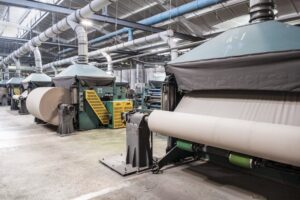
Ukrainian exporters of Ukrainian exchange-traded commodities in 2021 have no reason to complain about the external conditions of business due to favorable prices for these commodities and partly excellent harvest, so they should focus on adapting their business to possible future problems, a member of the board of bank Pivdenny (Odesa) Oleksandr Matiushenko has said.
“If we are talking about 2021 and a good harvest on the one hand, and on the other hand, a gorgeous price for us in the foreign market, then I think that this year absolutely all exporters associated with export commodities will not complain that they are not satisfied with something, because today we are witnessing a fairly stable hryvnia exchange rate, the consequences of which are good positions of our export and raw material base,” he said at the CFO Forum in Kyiv on Wednesday.
Matiushenko said that Ukrainian business is successfully coping with the situation that has developed in connection with a sharp rise in prices in the gas or coal market, and its representatives should adapt to possible difficulties in the future, such as problems arising under the terms of concluded contracts or reducing their internal costs.
The banker also said that he considers the hryvnia exchange rate this year adequate with the expected policy of the National Bank of Ukraine.

Ukrainian Foreign Minister Dmytro Kuleba has opened the First Centre for ASEAN (Association of Southeast Asian Nations) Countries Studies in Ukraine at the Institute of International Relations of the Taras Shevchenko National University of Kyiv.
“Last year, ambassadors of the ASEAN countries and I discussed in Ukraine what we could do to develop cooperation. I proposed to create Centre for ASEAN Countries Studies in Ukraine. Today we have implemented this initiative. The Centre is laying the foundation for a qualitatively new level of cooperation between Ukraine and ASEAN,” the press service of the Ukrainian Foreign Ministry quoted Kuleba as saying on Tuesday.
The main task of the centre will be to establish effective interaction between researchers and scientific employees, the development of humanitarian and educational contacts between Ukraine and the ASEAN countries.
The minister recalled that this year, for the first time since independence, Ukraine has received a Foreign Policy Strategy, and noted that it paid due attention to Ukraine’s relations with Asian countries. According to him, work with this region should be systematic.
Kuleba noted that the next marker of the development of relations will be Ukraine’s accession to the Treaty of Amity and Cooperation in Southeast Asia.
“Our state has already submitted an application, which is under consideration by ASEAN partners. This will not only be an impulse for further development, but also a clear signal about the new quality of relations between Ukraine and the ASEAN countries,” the Foreign Minister said.
Kuleba said that Ukraine is working to achieve a trade turnover between Ukraine and ASEAN of $5 billion per year.
“I am convinced that it is quite possible to achieve a trade turnover between Ukraine and ASEAN of $5 billion a year, and we are working to implement this goal. We are working to ensure that as many Ukrainian goods, especially those with high added value, are exported to Asian markets,” the minister assured.

The Ukrainian market for mergers and acquisitions (M&A), which until recently experienced a shortage of buyers, has been growing for the third year in a row, Serhiy Budkin, the Managing Partner of FinPoint Investment Advisers, has said.
Commenting on the situation on the market within the framework of the Kyiv International Economic Forum, the expert predicted several large transactions in the next 12 months, including in the financial sector, IT and development.
The founder of UFuture Holding, Vasyl Khmelnytsky, at the forum estimated the average multiplier when evaluating Ukrainian companies at about 6. In particular, speaking of the annual sales of his company at $70 million, he estimated its value at about $420 million, although in Europe it could cost $700 million.
Khmelnytsky told Interfax-Ukraine that the multiplier for Ukrainian companies may vary depending on the industry, for example, in medicine – 8, while in manufacturing – 5.
At the same time, the entrepreneur noted that some foreign buyers still expect a lower price and a high return on investment from Ukrainian investments – in 4 years, while the multiplier 6 is about 15% per annum.
Budkin generally agreed with this assessment of the multiplier for Ukrainian companies.
“The multiples have a tendency to increase. The revival [of the M&A market] leads to an increase in the multiplier in itself,” he said.

Over the nine months of 2021, DTEK Energy has allocated almost UAH 1.7 billion for the repair campaign of thermal power plant (TPP) units, station equipment, buildings and structures, the company’s press service said.
According to its data, power engineers have implemented 23 out of 28 planned (including additional) repairs of power units of thermal power plants this year. In particular, 82% of the planned volume of the repair campaign has been completed. The work was carried out at the blocks of Kryvy Rih, Prydniprovska, Zaporizhia, Kurakhove, Luhansk, Burshtyn, Dobrotvirska and Ladyzhin TPPs.
Five unit repairs are underway at Zaporizhia, Kurakhove, Luhansk, Dobrotvirska and Ladyzhin TPPs. By the end of the year, it is planned to implement one more scheduled repair of power units at Burshtyn TPP.
“The task of each participant in the energy market is to do everything in his power to prepare for winter. DTEK Energy’s maneuver capacities have repeatedly supported the Ukrainian energy system, operating at maximum and smoothing out peak periods of electricity consumption. This is especially important during the heating season. Despite the difficult situation on the market, we are investing in the repair of equipment at thermal power plants in order to minimize any interruptions in operation and ensure the stable operation of TPPs, and with them the entire energy system,” CEO of the company Ildar Saleev said.
Ukrainian banks in January-August 2021 issued 6,570 mortgage loans worth over UAH 5.2 billion, which is 2.2 times higher than the figure for eight months of 2020 in terms of the number of such loans and 2.9 times – by volume, the National Bank of Ukraine (NBU) reported following a monthly survey of Banks.
According to it, in August, 944 mortgage loans were issued for UAH 830.1 million, compared with 531 loans for UAH 358.1 million a month earlier.
The press service noted that the mortgage lending market remains concentrated: the five most active banks have concluded 89% of new transactions.
It is indicated that loans for the purchase of housing in the secondary real estate market remain the main driver of the market: in August, their share exceeded 90% of all mortgage loans provided both in terms of the number of contracts and in terms of monetary volume, the press release notes.
The results of the survey indicate that the average size of a loan for the purchase of housing in August increased to UAH 879,300 from UAH 793,800.
According to the NBU, in August the average effective rate of a mortgage loan in the secondary market rose to 13.60% compared to 13.35% in July, and in the primary market fell to 15.9% from 16.82%.

The volume of commercial products of Kyivsky cardboard paper mill (Obukhiv, Kyiv region), the leader in the pulp and paper industry in sales, increased by 30.1% in January-September 2021 compared to the same period in 2020, to UAH 5.421 billion.
According to the statistics of the Ukrpapir association provided to Interfax-Ukraine, the plant has slightly accelerated the production growth rate in monetary terms compared to the same period last year (in the first half of the year it was 22%, over eight months – 29.3%).
In quantity terms, in particular, the plant increased output of corrugated packaging by 4.7% over this period, to 183 million square meters, keeping the second position in production of these products after Rubizhne cardboard and packaging mill (together with Trypilsky packing plant).
Output of base paper for sanitary and hygienic products increased slightly (by 0.3%), to 64,300 tonnes, and production of toilet paper in rolls decreased by 6.8%, to 312.2 million pieces.
The highest growth rate in January-September was again shown by production of cardboard, however, the growth rate slowed down a bit – to 13.5%, 174,100 tonnes were produced. In particular, boxboard was produced 34% more – 67,500 tonnes, and container (including paper for corrugation) – 3.4% more, 106,500 tonnes.
According to the association, in general, enterprises in the industry have increased output of corrugated packaging by 7.3%, to 554.34 million square meters, paper and cardboard by 12%, to almost 670,000 tonnes. Production of toilet paper in rolls decreased by 3%, to 518.34 million pieces.